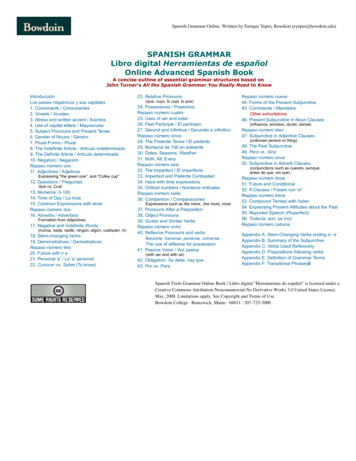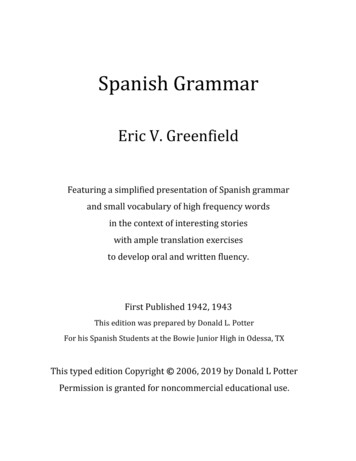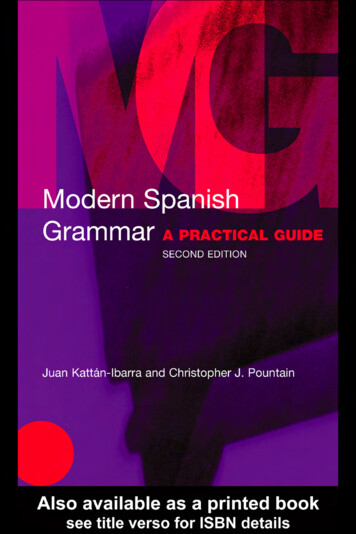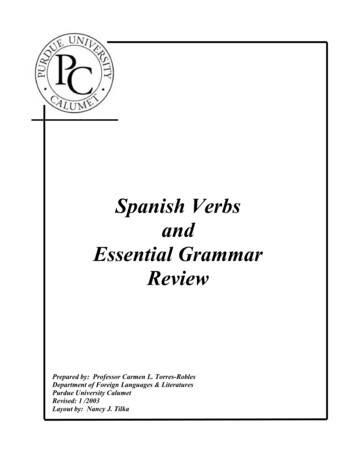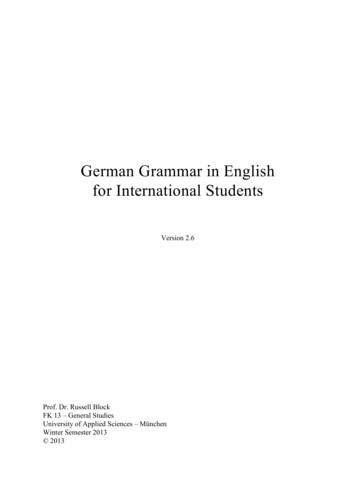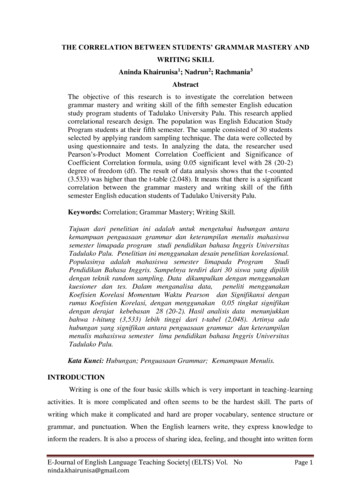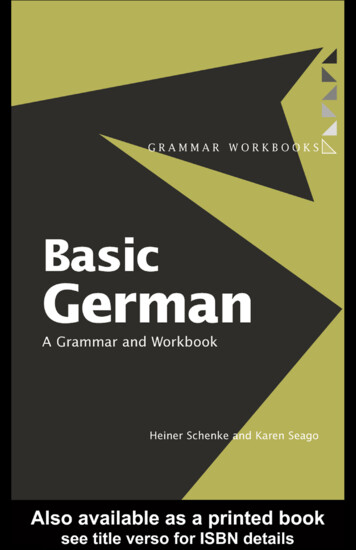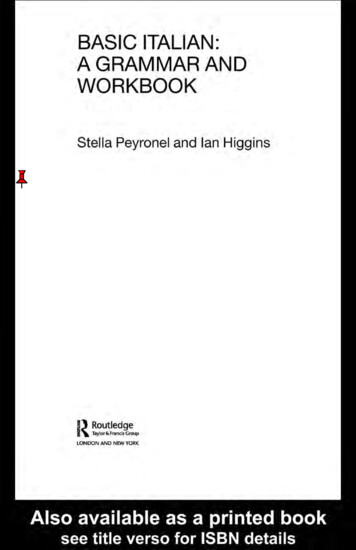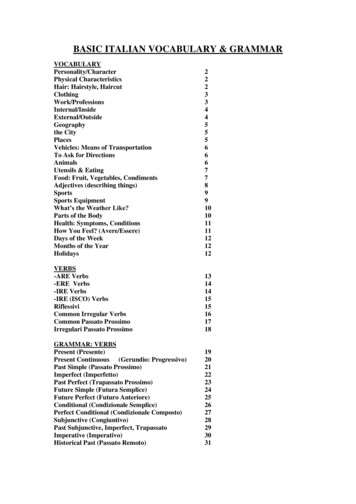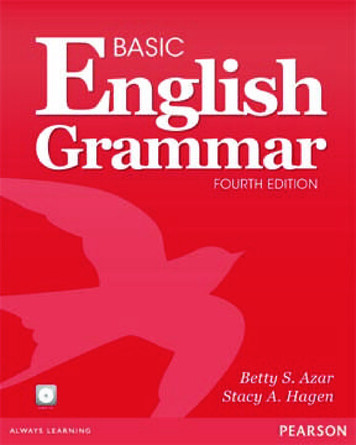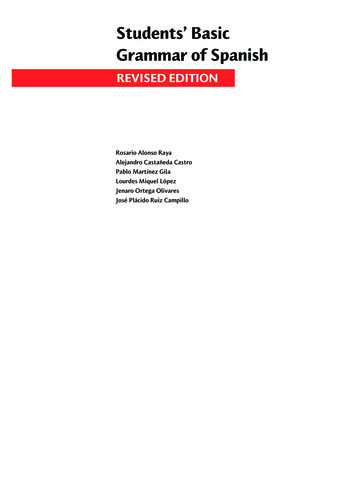
Transcription
Students’ BasicGrammar of SpanishREVISED EDITIONRosario Alonso RayaAlejandro Castañeda CastroPablo Martínez GilaLourdes Miquel LópezJenaro Ortega OlivaresJosé Plácido Ruiz Campillo001-012 gbee er intro usa.indd 330/08/13 10:24
First edition: august 2009 The authors and Difusión.Centro de investigacionesy publicaciones de idiomas, S.L.c/Trafalgar, 10, entlo. 1ª08010 BarcelonaTel. ( 34) 93 268 03 00 / Fax ( 34) 93 310 33 sario Alonso RayaAlejandro Castañeda CastroPablo Martínez GilaLourdes Miquel LópezJenaro Ortega OlivaresJosé Plácido Ruiz CampilloRosario Alonso, Alejandro Castañeda, Lourdes Miquel andJenaro Ortega’s involvement in this edition is linked to thedevelopment of project number FFI2009-13107, financedby the Ministry of Science and Innovation.AcknowledgementsPeople who search for grammar books are looking for a mapto an unknown land. They are pirates, astronauts, crazyadventurers bent on discovering an entire universe. There isnothing more daring nor more generous than learning a language. It is an endless undertaking, overwhelming and worthyof heroes. Like Adam in the Garden of Eden, you start toname the world afresh. If you have got this far and are holding this grammar book in your hands, you are already oneof us. Thank you.Thanks also to our students of the Centro de LenguasModernas of the University of Granada, of the EscuelaOficial de Idiomas-2 in Barcelona and of the InstitutoCervantes in Istanbul, all expedition members on the Safariof learning, for it is really they who have shown us where theCoordination and design: Jordi Sadurní VenturaEditing: Paco Riera Arteaga, Jordi Sadurní i VenturaCover design: Oscar García OrtegaEducational consultant: Agustín GarmendiaDocumentation: Olga MiasEnglish edition: Bob Flory, Brian BrennanIllustrations: David RevillaPhotographs: Pág. 36, 102, 106, 116, 140,146, 153, 217, 234, 237: autores y familiares.Pág. 44: 1: Rasmus Evensen, Didvision, 2: JohnPring (john@johnpringphotography.com), 3: FrancoGiovanella (franco@revistanossa.com.br), 4: San San(san@loungefrog.com). Pág. 110: João Estevão A.de Freitas (jefras@netmadeira.com). Pág. 193: RealIbérico, Consorcio para la Promoción del JamónIbérico Español.sinking sands, the oases, the caves and volcanoes, the wildwatercourses and the cool pools of crystal-clear waters are.For it is they who have guided and corrected the lines on thismap with the lucid testimony of their grammatical adventures. For it is not they who have learned from this grammarbook: it is this grammar book that has learned from them.Thank you to the inventive genius of David Revilla ourartist; thank you for the support, patience and help ofAgustín Garmendia and the Difusión production team, thankyou for the sensitivity, involvement, understanding andenthusiasm of Jordi Sadurní.And, above all, we thank our long-suffering families and ourtemporarily abandoned friends for having put up with ourlong absences in imaginary countries.From our long stays in the region of the pronouns, in thejungle of the subjunctive, and on the planet of qué, quién,Printed by Tallers Gràfics Soler S.A.cuál or in the castle of ser and estar, we returned worse offISBN: 978-84-8443-437-5Legal deposit: B-25797-2013and on the verge of being seduced by the dark side of thethan we had set out, more aware of the bottomless chasmsAny form of reproduction, distribution, public communication or transformation of this work is strictly prohibited without the consent of the intellectual property owners. Any violation of the above-mentioned rights couldconstitute a criminal offence against the intellectual property (Art. 270 andfollowing of the Penal Code).force. Adoración, Alicia, Ángela, Antonio, Arnau, Carlota,Carmen, Carmen, Francisca, Gloria, Héctor, Inma, Juani, Jesús,Lucía, Lucía, Lucía, Luis, Mari, Mopa, Plácido, Puchi, Rosario,Samuel, Teo, Xavier, your contributions are priceless.The map makers001-012 gbee er intro usa.indd 424/10/13 11:14
Index10Introduction11How the SBGS is organisedsection 1 Nouns and Adjectives141. Noun. The gender of things14 a General rule: el edificio, la casa 14 b Special rules: el problema, la mano 172. Noun. The gender of people and animals17 a General rule: doctor, doctora 18 b Special rules for the gender of people: marido, mujer 19 c Special rules for the gender of animals: toro, vaca 203. Noun. Number20 a Forming the plural: mapa, mapas; país, países 21 b Special cases: la gente, las gafas 234. Adjective232425262628abcdefGender: guapo, guapa; interesante Number: guapos, guapas; interesantes Concordance: Unos amigos griegos.Adjective after noun: ¿Vino tinto o vino blanco?Adjective before noun: Mi apartamento pequeño / Mi pequeño apartamentoUn gran problema / Un problema grandesection 2 Determiners001-012 gbee er intro usa.indd 5305.3031333436Articles: Un, el, øa Formsb Uses: Toma una carta / Toma la cartac ¿Un o el o ø?: Tenemos teléfono. Suena un teléfono. He roto el teléfono.d Generalising: A los españoles les gusta el café e Uno alto, el de Soria, el que te dije 376.37393940Demonstratives: este, ese, aquel esto, eso, aquello a Este libro; ese libro; aquel libro.b Uses connected with time: Este mes. Ese día. Aquel fin de semana.c Este, ese, aquel d Neutral demonstratives: ¿Dónde pongo esto? No me digas eso. ¿Qué es aquello?437.434546474849Possessives: mi, tu, su mío, tuyo, suyo a Possessives before the noun: mi amigo, mi amiga b Possessives after the noun: un amigo mío, una amiga mía c Un amigo mío / Mi amigod Without noun: Tu casa es bonita pero la mía es más grande.e ¿De quién es? Es nuestro: mío, tuyo y de Pepe.f Special cases:: Tengo el pelo mojado.508.50525354Indefinite articles: todos, algunos, alguien, nada, otros a Algún estudiante, ninguna casa, todos los días b Alguien, nadie; algo, nada; todo.c Double negative: No hay ninguno; no hay nadie; no hay nada.d Otro, otra, otros, otras.569.565758595960Cardinal numbers: uno, dos, tres a From 0 to 15b From 16 to 99c From 100 to 999d From 1.000 to 999.999e Millón, millones f How to say numbers in Spanish.30/08/13 10:24
6110.61626263Ordinal numbers: primero, segundo, tercero a Meaning and formsb How they workc Usesd Ordinals from 10th upwards6411. Quantifiers: demasiado, mucho, bastante 64 a With nouns: mucho chocolate / muchas galletas65 b Poco / un poco de uncountable nouns: Hay un poco de comida perohay poca bebida.66 c With adjectives, adverbs and verbs: Corre mucho; es muy rápido; está muy lejos.section 3 Personal pronouns6812.687070Personal pronouns. Introduction.a Subject, direct object and indirect objectb Reflexive constructions: Ella se pinta.c Constructions that express opinions: A Jaime le gustan las motos.7113. Subject pronouns: yo, tú, él 71 a Forms: yo, tú, él 72 b With and without the pronoun: ¿Cómo te llamas? / ¿Tú cómo te llamas?7314. Pronouns with prepositions: a mí, para ti, con él 73 a Forms74 b Conmigo, contigo, con él 15.75757678Object pronouns: me, te, nos lo, la, le, los a First and second person: me, te, nos, os.b Third person: lo, la, los, las / le, les.c Neutral lo: Yo eso no lo entiendo. Parece fácil, pero no lo es.7916.798080818283Position and combination of object pronounsa One pronoun: Te he visto. Os he visto.b Combination of two pronouns: Te lo compro. Os lo compro.c Combination of two pronouns: Se lo compro. Se la compro.d With affirmative imperative, infinitive and gerund: déjasela, dejársela, dejándosela e With periphrastic verbs: Tienes que comértelo / Te lo tienes que comerf In reflexive and opinion-expressing constructions: Se las lava. Le gusta el chocolate.8417. Presence and redoubling of pronouns84 a Use of lo, la, los, las / le, les: Lo ha comprado. Le ha dado un regalo a María.85 b Redoubling: Me ha mirado a mí.8718.87888990929597100Reflexive and opinion-expressing constructionsa Reflexive constructions: Me baño. Me lavo los dientes.b Uses: Te has mojado. Te has mojado el pelo. Te has mojado la blusa.c Reciprocity: Nos conocemos. Nos queremos.d Cambios de estado: El fuego se ha apagado y la comida se ha enfriado.e Ir(se), llevar(se) / venir(se), traer(se)f Verbos de ingestión: comer(se), beber(se), tomar(se)g Construcciones impersonales con se: Aquí se vive bien / Se invitó a toda la familia.h Opinion-expressing constructions: Me gusta Les da miedo Nos parece bien section 4 Verbs001-012 gbee er intro usa.indd 610419.104105106Conjugation. The basic building blocks.a Talking about a verb: the infinitive.b Conjugating a verbc Verb and subject concordance10720.107107108109Non-personal forms: hablar, hablando, hablado.a Meaning and form of the infinitive: hablar, comer, vivir.b The infinitive as a nounc The infinitive as a verbd Meaning and form of the gerund: hablando, comiendo, viviendo.30/08/13 10:24
110111112113efghUses of the gerund: Está subiendo. Subiendo a la derecha.Meaning and form of the past participle: hablado, comido, vivido.Use as an adjective: Una cosa terminada. Está terminada. La tengo terminada.Use of compound verb forms: he salido, había salido, habré salido 11421.114115115116117118118119120Presente de indicativoa Regular verbs: hablo, como, vivo b Verbs with vowel changes: quiero / puedo, juego c Verbs with vowel changes: pido, repito d First person irregular: hago, pongo, salgo e First person irregular and other changes: tener, venir, decir, oír, estar.f Very irregular verbs: ir, ser, haber.g Uses. Present affirmations: Mi novio está en Madrid.h Uses. Future affirmations: Mi novio vuelve mañana.i Uses. General affirmations: Los hombres son así.12122.121122124Pretérito perfecto de indicativoa Meaning and forms: he hablado, he comido, he vivido b The recent past: Ha llovido mucho. Este verano ha llovido mucho.c The past in the future: A las cinco he terminado.12523.125126127127128Pretérito indefinidoa Meaning and forms: hablé, comí, viví b Verbs with an irregular stem: dijo, puso, estuvo c Verbs with vowel changes: pidió, durmió d Dar, ir, ser.e Uses:: El viernes pasado los vi. Cuando entraba, los vi.12924. ¿Perfecto or Indefinido? Ha salido / Salió129 a Present and past time periods: Este año ha sido horrible / El año pasadofue horrible130 b Unspecified time periods: Nunca ha pasado nada / Nunca pasó nada132 c Recent time periods: Ya he terminado / Ya terminé25.133133134135135136137Pretérito imperfecto de indicativoa Meaning of the Imperfectob Regular forms: hablaba, comía, vivía c Very irregular verbs: ir, ser, ver.d Uses of the Imperfecto. Describing qualities: Era una chica muy guapa.e Uses of the Imperfecto. Describing habitual situations: Antes dormía mucho.f Uses of the Imperfecto. Describing temporary situations: A las dos estaba durmiendo.13826.138139140142142143144¿Imperfecto, Indefinido or Pretérito perfecto?a Describing temporary situations or talking about completed eventsb Completed activities (Indefinido) and parts of an activity (Imperfecto)c Stative qualities (Imperfecto) or dynamic qualities (Indefinido)d Describing habitual situations (Imperfecto)e Narrating eventsf Imperfecto or Pretérito perfecto? Salía / Ha salidog Narratives happening now or not happening now14627. Pluscuamperfecto de indicativo146 a Meaning and forms: había hablado, había comido, había vivido 147 b Use: el pasado del pasado.001-012 gbee er intro usa.indd 714928.149149150151152Futuroa Meaningb Regular forms: hablaré, comeré, viviré c Irregular verbs: diré, querré, tendré d Uses. Predicting the future: Mi novio volverá mañana.e Uses. Making suppositions about the present: Mi novio estará en Madrid ahora.15429.154154155Futuro perfectoa Meaning and forms: habré hablado, habré comido, habré vivido b Uses. Imagining the recent past: Habrá dormido poco, supongo.c Uses. Predicting the past in the future: Mañana habré terminado.30/08/13 10:24
15615615715830. Condicionala Regular and irregular forms: hablaría, comería, viviría, querría b Making suppositions about the past: Serían las cinco, más o menos.c Making hypothetical statements about the present and the future: Yo no diría nada 15915915931. Condicional compuesto: habría hablado a Forms: habría hablado, habría comido, habría vivido b Making suppositions about the anterior past: Habría salido,porque no abría.c Making hypothetical statements about the recent past: Yo nohabría dicho nada 118232. Forms of the subjuntivo: hable, haya hablado a Regular forms of the Presente de subjuntivo: hable, coma, viva b Verbs with vowel changes: pedir, sentir, dormir c Verbs with irregular roots: salga, diga, ponga d Very irregular verbs: ser, estar, ver, ir, haber, saber.e Forms of the Pretérito imperfecto de subjuntivo: hablara (-se), comiera (-se),viviera(-se) f Forms of the Pretérito perfecto de subjuntivo: haya hablado/comido/vivido g Forms of the Pluscuamperfecto de subjuntivo: hubiera (-se) hablado/comido/vivido 33. Indicativo or subjuntivo?a Making statements (indicativo) or non-statements (subjuntivo)b Expressing wishes and desired outcomes: Quiero que venga.c Stating or querying information: Creo que viene / No creo que vengad Making statements or requests: Dice que viene / Dice que vengae Expressing an opinion about information: Es estupendo que venga.f Identifying or not identifying people, things or places: La chica que viene / La chicaque vengag Relating two events in timeh Corresponding time references between the indicativo and the subjuntivo18334.183183184185185186Imperativoa Usesb Imperativo with tú: come c Imperativo with vosotros: comed d Imperativo with usted y ustedes: coma, coman e Imperativo negativo: no comas, no comáis, no coma, no coman f Imperativo with pronouns: Dímelo / No me lo digas18735. Ser and estar187 a Ser: Julio César es un gato.188 b Estar: Julio César está dormido.36.190190191192Haber and estara Forms of haber: hay, había, habrá b Uses of haber in the impersonal form: ¿Hay un hospital por aquí cerca?c Haber / Estar:
Grammar of Spanish REVISED EDITION 001-012_gbee_er_intro_usa.indd 3 30/08/13 10:24. Acknowledgements People who search for grammar books are looking for a map to an unknown land. They are pirates, astronauts, crazy adventurers bent on discovering an entire universe. There is nothing more daring nor more generous than learning a lan- guage. It is an endless undertaking,
